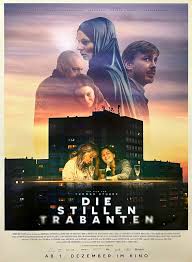
DARK SATELLITES/ DIE STILLEN TRABENTEN
Germany, 2022, 120 minutes, Colour.
Nastassja Kinski, Martina Gedeck, Albrecht Schuch, Irina Starshenbaum, Lilith Stangenberg, Charly Hubner, Adel Bencherif.
Directed by Thomas Stuber.
For quite some time, we, the audience, may be puzzling over the title of the film. Half way through, there is an explanation. In this German city, in former East Germany, in the evening, the tall high-rise apartment blocks, lights coming on, going out, and the empty space surrounding, suggests dark satellites.
Given that most of the action takes place in the city, often in the dark, in the early hours, it seems surprising that the film opens in the German countryside, workers, some migrants, a stranded group where a little girl has eaten poisonous leaves and is dying, the workers’ boss calling on Hamid to speak with the group and translate.
Then begins Hamid’s story, refugee, Muslim and devout, married, making friends with the owner of a diner, Jens, who works with his schoolfriend, Mario (who makes racist jokes at Hamid). But Hamid enjoys returning to chat with Jens, and finding that they live in same apartment block, same floor. Later Hamid will invite Jens to visit the mosque.
Which leads the audience to Jens’ story, a genial man in his mid-30s, curious about Hamid and his beliefs and prayer, but each evening, after work, encountering Aischa, Jens’s wife, wearing the hijab, but with burns on her arms and wrist, continually smoking. Initially reticent, she responds to Jens’ friendship, talking together, sharing experiences, her always being cautious, but the friendship becoming more intimate.
The there are also parallel stories which do not connect, but taking place in the same city, at the same time.
The main story is that of Christa (Martina Gedeck), husband now dead, children at any distance, working as a railway cleaner in the night hours, finishing by about 11 or later, going to a bar, quietly drinking. She encounters a local hairdresser, Birgitt (Nastassja Kinski). Each night they meet. They talk. They drink. They share stories. Christa becomes more and more infatuated with Birgitt, is quite upset when she has to leave, but happy on her return, getting her hair done…
In the meantime, there is Erik, a security guard, living alone in a hut, going his rounds, intrigued by a young girl sitting on a playground swing. They eventually get to know each other, talk, her being able to tell her story, Erik experiencing a great attraction.
Which means that this is a film about lonely people, possibilities for connection, possibilities for love, sometimes doomed, sometimes happy, in the spaces surrounded by the dark satellites.
- The title, the explanation, the visuals of the high-rise buildings at night, dark, like satellites, flying in space, the images and symbols?
- East Germany, 21st-century, memories of the past, the Soviet Union and unification?
- The opening, the countryside, the crew, the discovery of the men, refugees, the intervention of Hamid, finding the group, the young girl poisoned by the flower? The police arriving?
- The screenplay then following various stories, the interconnections or not, parallels?
- Hamid’s story, his background, migrant, his wife, at work, language? Going to the diner for the sandwich, issues about pork? The meeting with Jens, friendship with Jens, accommodating his tastes? Mario in the diner, the racist jokes, New York sandwich called 9/11? Hamid and his returning, growing friendship, the two men as neighbours in the apartment? Jens going home, as meeting with Aischa, hijab, Muslim, the burns on her arm, self-inflicted, smoking? Their talking, looking at the darkening sky, the explanation of dark satellites? Jens and his infatuation, the gradual breaking down of the barriers, Aischa and her continued smoking, Jens fascinated by Hamid and his prayer, beliefs, providing the red carpet as a mat for his prayer, the invitation to go to the mosque, his observing the men and their prayer, Aischa indicating silence? The two becoming closer, Aischa collapsing, illness, his washing the clothes? The intimacy between them? the disappearance without explanation, the apartment bare?
- Jens at the diner, school head friendship with Mario, the issue of the red carpet, in the diner instead of tiles, walking like the stars? Hamid and the comment on tiles, the decision, Jens and his father, the work, and Mario disappearing?
- Christa and her story, at night at the railway station, throwing out the cans and putting them back, her work as a cleaner, criticisms from the authority? Going to the bar, drinking, the bartender, the encounter with Birgit, their talking, the growing friendship, intimacy, drinking, Birgit and her work at the hair salon, the routine of meeting, going home in the early hours, the attraction, sharing, stories? The emotional effect for Christa, the sexual consequences? Grief at the absence, Birgit and her return, the music, dancing, cutting Christa is hair? The work, the supervisor, Christa confronting, leaving, going to the apartment, two women together?
- Erik, security guard, his rounds and routines, his background, contact with the team, is nights at work? Marika on the swing, at night, the interactions between the two, the growing friendship, sharing of stories, the sexual effect on Erik at home, development of the friendship?
- A film about ordinary people, ordinary jobs, loneliness, friendships, hopes and fulfilment?